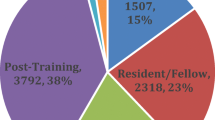Abstract
Objective
Podcasts have recently been introduced into psychiatry education, despite limited evidence evaluating podcasting in medical education. PsychEd is an educational, publicly available podcast targeting junior learners in psychiatry. This study characterized PsychEd’s listeners and the podcast’s role in their education.
Methods
The study involved a mixed-methods survey, followed by semi-structured phone interviews with respondents. There were 97 survey responders in total, of whom 9 participated in a telephone interview. Survey responses were coded as interval data and analyzed descriptively using statistical software. Interviews were transcribed and coded for emergent themes using a grounded theory model.
Results
PsychEd listeners represented an interprofessional audience, with 46 respondents (48%) being physicians or physicians in training, and 34 (35%) being allied mental health professionals. All respondents (100%) rated the podcast as “helpful” or “very helpful” for general knowledge. Listeners were attracted to PsychEd for the auditory learning format, the opportunity to review existing knowledge, the focus on core topics, the Canadian expertise, and the presentation of “clinical pearls.” Respondents highlighted valuable qualities of a psychiatry podcast: conversational, case-based, narrative approach, longer episodes (i.e., 30–60 minutes) as compared to other medical specialties, and a clinical focus. Furthermore, they identified podcasts as an opportunity for shared interprofessional curricula.
Conclusion
This study is the first to examine the motivations and experiences of listeners of a psychiatry educational podcast. The findings support existing literature on the benefits of podcasts in medical education. Future studies should explore the impact of podcasts on learning and behaviors.
Similar content being viewed by others
References
Fletcher S, Watson AA. Magnetic tape recording in the teaching of histopathology. Br J Med Educ. 1968;2(4):283–92.
Hammersley B. Why online radio is booming. Guardian. 2004;11.
Ho PA, Girgis C, Rustad JK, Noordsy D, Stern TA. Advancing the mission of consultation-liaison psychiatry through innovation in teaching. Psychosomatics. 2019;60(6):539–48.
Matava CT, Rosen D, Siu E, Bould DM. eLearning among Canadian anesthesia residents: a survey of podcast use and content needs. BMC Med Educ. 2013;13:59.
Purdy E, Thoma B, Bednarczyk J, Migneault D, Sherbino J. The use of free online educational resources by Canadian emergency medicine residents and program directors. CJEM. 2015;17(2):101–6.
Riddell J, Swaminathan A, Lee M, Mohamed A, Rogers R, Rezaie SR. A survey of emergency medicine residents’ use of educational podcasts. West J Emerg Med. 2017;18(2):229–34.
Cadogan M, Thoma B, Chan TM, Lin M. Free open access Meducation (FOAM): the rise of emergency medicine and critical care blogs and podcasts (2002–2013). Emerg Med J. 2014;31(e1):e76–e7.
Cho D, Cosimini M, Espinoza J. Podcasting in medical education: a review of the literature. Korean J Med Educ. 2017;29(4):229–39.
Schreiber BE, Fukuta J, Gordon F. Live lecture versus video podcast in undergraduate medical education: a randomised controlled trial. BMC Med Educ. 2010;10:68.
Davidson SM, Grunau Z, Marcovitz D, Gerdner OA, Stoklosa J, Vestal HS. Narrative podcasts as a teaching tool in psychiatry. Acad Psychiatry. 2019;43(3):275–9.
Jones K, Doleman B, Lund J. Dialogue vodcasts: a qualitative assessment. Med Educ 2013;47(11):1130-1, 1131.
Wilson P, Petticrew M, Booth A. After the gold rush? A systematic and critical review of general medical podcasts. J R Soc Med. 2009;102(2):69–74.
Vasilopoulos T, Chau DF, Bensalem-Owen M, Cibula JE, Fahy BG. Prior podcast experience moderates improvement in electroencephalography evaluation after educational podcast module. Anesth Analg. 2015;121(3):791–7.
Alam F, Boet S, Piquette D, Lai A, Perkes CP, LeBlanc VR. E-learning optimization: the relative and combined effects of mental practice and modeling on enhanced podcast-based learning-a randomized controlled trial. Adv Health Sci Educ Theory Pract. 2016;21(4):789–802.
Back DA, von Malotky J, Sostmann K, Hube R, Peters H, Hoff E. Superior gain in knowledge by podcasts versus text-based learning in teaching orthopedics: a randomized controlled trial. J Surg Educ. 2017;74(1):154–60.
Bhatti I, Jones K, Richardson L, Foreman D, Lund J, Tierney G. E-learning vs lecture: which is the best approach to surgical teaching? Color Dis. 2011;13(4):459–62.
Lien K, Chin A, Helman A, Chan TM. A randomized comparative trial of the knowledge retention and usage conditions in undergraduate medical students using podcasts and blog posts. Cureus. 2018;10(1):e2065.
Weinstock M, Pallaci M, Aluisio AR, Cooper B, Gottlieb D, Grock A, et al. Effect of interpolated questions on podcast knowledge acquisition and retention: a double-blind, multicenter, randomized controlled trial. Ann Emerg Med. 2020;76(3):353–361.Weinstock M, Pallaci M, Aluisio AR, Cooper B, Gottlieb D, Grock Aet al. Effect of interpolated questions on podcast knowledge acquisition and retention: a double-blind, multicenter, randomized controlled trial. Ann Emerg Med 2020;76(3):353-361.
Heydari MR, Taghva F, Amini M, Delavari S. Using Kirkpatrick’s model to measure the effect of a new teaching and learning methods workshop for health care staff. BMC Res Notes. 2019;12(1).
Kirkpatrick DL. Techniques for evaluating training programs. J Am Study Train Dev. 1959;11:1–13.
Menezes N, Hawa R, Oswald R, Lee EK. Does one size truly fit all? The COUPE undergraduate perspective on competency-based medical education in psychiatry. Can J Psychiatry. 2018;63(6):356–60.
Funding
The study was funded by the Education Development Fund (Approval #107933) at the University of Toronto, Faculty of Medicine.
Author information
Authors and Affiliations
Corresponding author
Ethics declarations
Ethical Considerations
The study received ethics approval through the Health Sciences Research Ethics Board of the University of Toronto (protocol reference #34608).
Disclosures
On behalf of all authors, the corresponding author states that there is no conflict of interest.
Additional information
Publisher’s Note
Springer Nature remains neutral with regard to jurisdictional claims in published maps and institutional affiliations.
Rights and permissions
About this article
Cite this article
Hanafi, S., Nahiddi, N., Rana, A. et al. Enhancing Psychiatry Education through Podcasting: Learning from the Listener Experience. Acad Psychiatry 46, 599–604 (2022). https://doi.org/10.1007/s40596-022-01585-5
Received:
Accepted:
Published:
Issue Date:
DOI: https://doi.org/10.1007/s40596-022-01585-5




